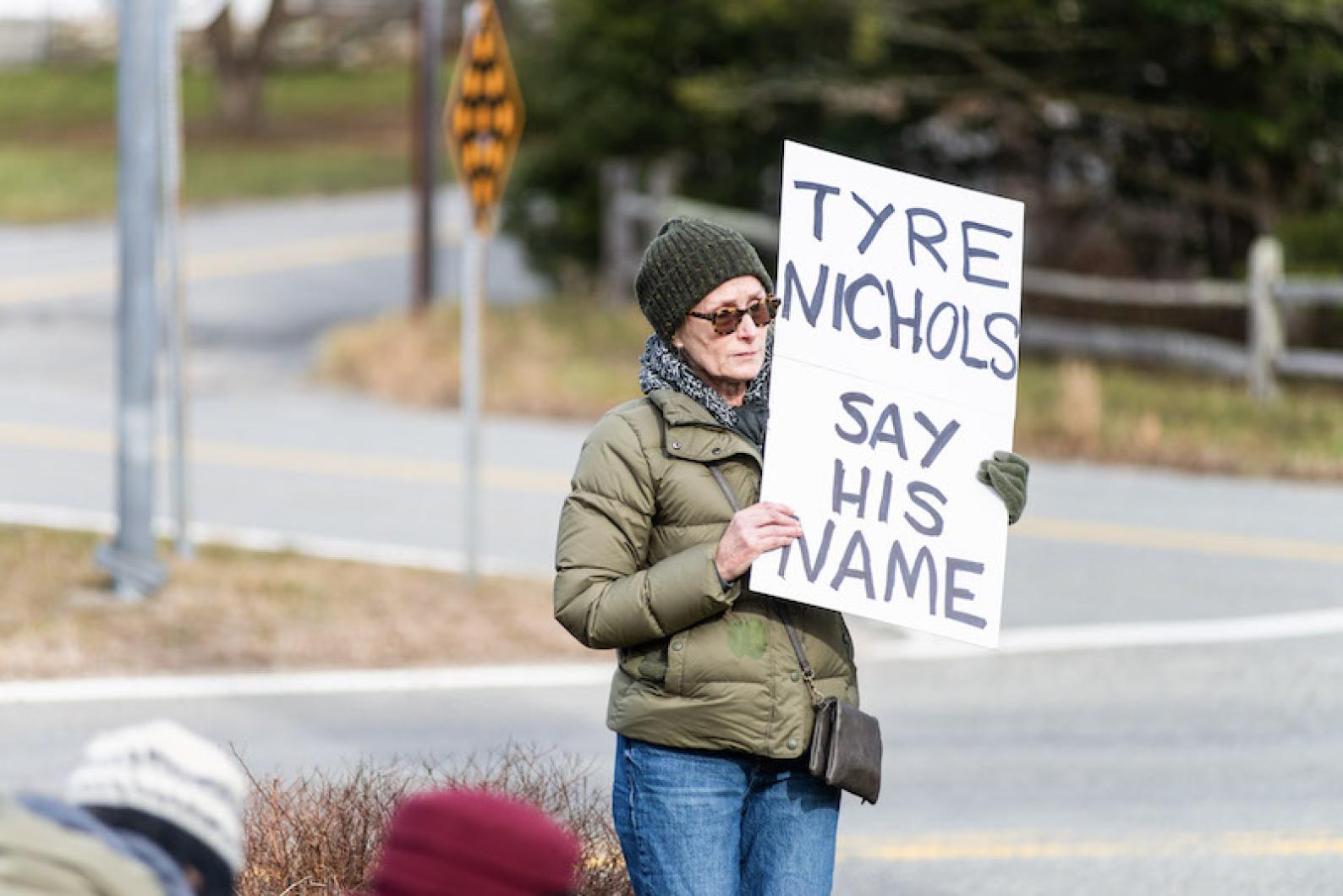Nearly three years after activists first gathered at Beetlebung Corner to protest the police killing of George Floyd, over a dozen racial justice advocates returned to the site Sunday for a silent vigil in memory of Tyre Nichols, a Memphis man killed by five police officers earlier this month.
The vigil was organized by the Martha’s Vineyard chapter of Black Lives Matter, and joined other demonstrations around the country calling attention to police brutality.
Following the death of George Floyd, participants knelt every morning from June 2020 to November 2020 for nine minutes and 29 seconds, the length of time officer Derek Chauvin kept his knee on the neck of Mr. Floyd. Vigils have since moved to once a week every Sunday.
This Sunday’s vigil began the same way, with community members kneeling on the Chilmark Library lawn for nine minutes and 29 seconds. Afterwards, they repeated Tyre Nichols’ name as they had done with countless other names before.
When the vigil opened up for discussion, several individuals expressed frustration that the state of policing and race in America had remained unchanged even after the protests and calls for reform that began three years prior.
“How much more can we even say at this point?” asked Holly Mackenzie.
“We have to keep saying it,” said Vicki Divoll, who had organized Sunday’s vigil.
Ms. Divoll said that she has been protesting at the up-Island intersection since June 2020, shortly after founder Dana Nunes first sat at the corner with a poster. In those three years, Ms. Divoll said the crowd was joined by a new person every demonstration. This Sunday that person was Kristi Straehler, an activist and leader of the Women’s League of Voters.
Ms. Straehler said she had been brought out by her friend and fellow activist Carla Cooper.
“I was absolutely heartstruck by what was going on,” Ms. Straehler said. “I wanted to be a part of this...to just be a part of the community doing this.”
Tyre Nichols had been stopped by members of the Memphis Police Department’s “scorpion unit,” a unit formed in 2021 meant to aggressively target violence in high-crime neighborhoods. Unlike previous high-profile cases of police brutality, Mr. Nichols’ death came at the hands of Black police officers.
BLM member Eric Adams said the news came as a betrayal.
“The integration of police departments was supposed to bring about change,” Mr. Adams said.
Martha’s Vineyard NAACP president Toni Kauffman shared in Mr. Adams’ grief.
“In my mind, it came to brother against brother,” she said.
The period of silence gave way to a larger question: What happens next? Ms. Divoll said she and other activists have been in talks with police departments on the Island to explore possible reforms, including requiring departments to answer mental health related calls alongside a trained mental health professional.
“A lot of the incidents that end in violence or death are incidents relating to mental health,” Ms. Divoll said, eliciting several nods from the crowd.
Although these talks have yet to bear fruit, Ms. Divoll said, she added that Edgartown police chief Bruce McNamee has been an early ally and advocate for better policing initiatives.
“We’re hopeful for the future,” she said.
One attendee, Jean Hay, said she hoped the Island could learn lessons from places like Oakland, which had recently voted to remove police presence in schools.
Ms. Kauffman said she had recently attended a regional NAACP meeting that had emphasized a measure of caution in its response.
“As painful as it was to watch, we were encouraged to have a better understanding of the situation at hand,” she said. “There was no call to action yet — key word yet — but I have a feeling we will be hearing more as things unravel.”
At the very least, Ms. Divoll believes that Islanders can play a significant role in fundraising for racial justice causes and continue to host conversations about race and justice in their communities. Later this year, the Martha’s Vineyard Diversity Coalition, joined by BLM, will be analyzing the racial makeup of police stops on Island.
“There are still a lot of unanswered questions,” Ms. Divoll said. “There’s still a lot of work to be done.”
BLM will host an open forum at 10:30 a.m. next Sunday, Feb. 5, at Beetlebung Corner.
For more information, visit mvblm.org.








Comments (19)
Comments
Comment policy »